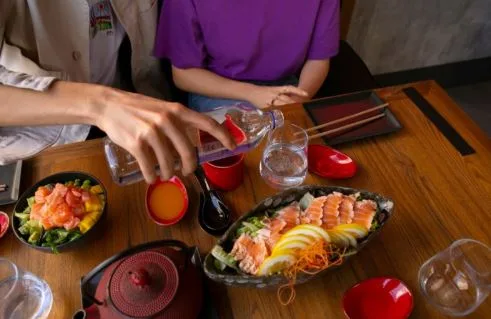Culinary Wildness at Its Best
In the heart of the Chinese culinary world, a new and bold concept has emerged: Men & Beasts. This isn’t just another restaurant or a catchy name. It’s a philosophy, a movement, and a dining experience that redefines what it means to eat boldly and authentically. Rooted in ancient traditions and wild flavors, Men & Beasts represents a marriage of humanity’s primal instincts and the artistry of traditional Chinese cuisine.
A Concept Born from Tradition and Instinct
Chinese cuisine has always been about balance—yin and yang, sweet and spicy, meat and vegetables. But Men & Beasts takes this balance a step further by tapping into an older, wilder tradition. Inspired by the untamed landscapes of rural China, this culinary philosophy reflects the rugged harmony between human beings and the animal kingdom. It brings to the table flavors that are powerful, earthy, and sometimes unexpected, yet rooted deeply in heritage.
Rather than toning down flavors to appeal to the masses, Men & Beasts embrace the strong tastes and bold textures found in game meats, traditional broths, and native herbs. It’s not uncommon to find dishes that use wild boar, venison, or pheasant alongside medicinal mushrooms and mountain spices.
A Wild Menu with Refined Technique
The menu at any restaurant embracing the Men & Beasts identity is a carefully curated adventure. It’s not about shock value—it’s about reawakening the senses. Dishes like braised wild boar in black bean sauce, slow-cooked deer ribs with chili oil, or sichuan-spiced pheasant speak to the primal connection between man and beast, but are prepared with the precision and grace of classical Chinese technique.
The chefs who adopt this style aren’t amateurs or gimmick-pushers. They are seasoned professionals who understand the importance of flavor layering, aroma balance, and regional authenticity. Many train in Sichuan, Hunan, or Inner Mongolia—regions known for their intense, meat-forward cuisines—before designing their own wild menus.
The Atmosphere: Rustic Meets Urban
Stepping into a Men & Beasts-themed restaurant is like entering a different world. The ambiance is intentionally rustic, filled with natural wood, stone textures, animal motifs, and dim lighting that evokes the mood of a forest lodge or ancient hunting house. Yet, it’s combined with modern elements: craft cocktails infused with ginseng, curated wine pairings, and attentive hospitality.
In cities like New York or San Francisco, where the food scene is already saturated with experimental concepts, Men & Beasts stands out because it doesn’t try to be trendy. Instead, it leans into its raw identity. Guests aren’t offered QR code menus with trendy small plates; they are presented with heavy, flavor-rich dishes meant to be savored slowly and shared communally.
The Cultural Story Behind the Beast
More than just a name, Men & Beasts carries deep cultural symbolism. In Chinese folklore, animals often represent virtues, strengths, or cautionary tales. The tiger symbolizes power, the deer brings longevity, the boar embodies bravery. When these animals are honored through food—not in a disrespectful or exploitative way, but with reverence—they become part of a larger story.
Some restaurants even include storytelling as part of the meal. Servers might explain the origin of a particular meat source, the traditional beliefs associated with the ingredients, or the significance of the cooking style. It creates a connection between diner and dish that is spiritual, not just sensory.
Sustainability and Ethical Sourcing
One of the most pressing concerns in modern cuisine is sustainability—and Men & Beasts doesn’t ignore this. In fact, the concept promotes responsible sourcing more than one might expect. Many ingredients are wild-harvested or obtained through regulated, small-scale farming methods. Game meat often comes from legal hunting programs that help manage wildlife populations and reduce ecological imbalance.
In China, where many ancestral villages still raise animals traditionally and forage naturally, chefs working within the Men & Beasts philosophy often form direct relationships with these communities. They import not just ingredients, but a way of life—where waste is minimal, and food is respected from start to finish.
Health Benefits of Wild Ingredients
Unlike heavily processed meats found in industrial kitchens, wild meat tends to be leaner, richer in omega-3s, and free of antibiotics. Many of the herbs and roots used in cooking—such as dang gui, goji berries, or cordyceps—have been used in Chinese medicine for centuries.
The philosophy behind Men & Beasts doesn’t just appeal to the palate—it’s built on a foundation of holistic wellness. Diners often report feeling more energized or grounded after meals, particularly when paired with herbal teas or broths. The experience is not just physical, but mental and emotional.
Who is it for?
While the bold concept might not appeal to every casual diner, Men & Beasts has quickly gained a loyal following among adventurous eaters, cultural explorers, and fans of traditional Chinese medicine. It’s especially popular among second-generation Chinese Americans who are eager to reconnect with their roots through food but also appreciate a modern twist.
Even vegans and vegetarians aren’t left out. Though the name implies carnivorous indulgence, many restaurants offer earthy vegetable dishes—like braised eggplant in spicy bean sauce or lotus root with wild herbs—that stay true to the wild, rustic ethos.
A New Culinary Movement
As food culture continues to evolve globally, concepts like Men & Beasts challenge diners to think beyond fast food and Instagram-worthy fusion plates. It’s a reminder that food isn’t just fuel—it’s history, identity, connection, and sometimes, confrontation with the parts of nature we’ve grown distant from.
For those tired of bland imitation dishes and craving something deeper, the Men & Beasts experience offers a chance to journey back to a time when meals were made with fire, patience, and raw reverence.
Conclusion
In a culinary world often filled with pretense and artificiality, Men & Beasts offer something refreshingly real. It is not just a brand or a restaurant style—it’s a statement. A plate of wild boar or mountain herb broth is more than food; it’s a conversation between man and nature. It’s a reclaiming of instinct, flavor, and identity in the most delicious way possible.






